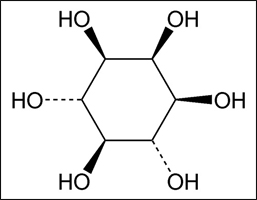Inositol – Uses, Benefits, Sources and Dosage

Inositol is one of B complex vitamin which is sometimes also called as the vitamin B8. It is required in small amount for healthy functioning of body. Inositol is present in all tissues of body but highest concentrations are found in heart, brain and lens of the eye. It is water soluble so body is not able to store it. So it is required daily in diet in order to avoid its depletion and deficiencies. Inositol’s functions are closely related with choline which is one of the primary components of cell membranes.
Health benefits of Inositol
- It is essential for growth of cells in the bone marrow, development of eye membranes and intestines.
- It helps to increase the HDL, good cholesterol levels in the body.
- It is good to improve the fertility in females and also resolves the symptoms of polycystic ovary syndrome (PCOS).
- It plays important role to metabolize fat and in cholesterol metabolism by breaking down fats into smaller particles which can be easily removed. Thus it helps to reduce the fats which are built in the body organs like liver.
- It helps to prevent the hardening of the arteries which is called arteriosclerosis.
- It helps to maintain healthy skin.
- It provides brain cell nutrition. It is considered as brain food as it works with choline.
- It helps to lower high estrogen levels which can be the cause of breast lumps.
- It supports the good health of brain. It has cooling effects and thus good for the depression, anxiety and panic attack.
- It helps in the production of neurotransmitters. These neurotransmitters are the chemicals that transmit messages between nerve cells like acetylcholine and serotonin.
- It is an essential component of myelin which helps in coating of nerves and regulates transmission. Thus it is good to treat nerve disorders.
Food Sources of Inositol
- Cereals
- Legumes
- Oranges
- Grapefruits
- Green leafy vegetables like spinach, cabbage, broccoli
- Bananas
- Cantaloupes
- Brewer’s yeast
- Milk
- Red beans
- Kidney beans
- Unrefined molasses
- Nuts
- Oat flakes
- Wheat germ
- Whole grain
Inositol deficiency
Deficiency of inositol results in the health impairment which may include:-
- Eye complications.
- Hair loss or patchy baldness.
- Eczema.
- Memory loss.
- Excess liver fat.
- Constipation
- Sleeplessness
- Anxiety
- Increased cholesterol level.
- Atheriosclerosis (narrowing of arteries)
Daily recommended dosage of inositol
There is no specified dosage of inositol but supplements provide daily 500 miligrams of inositol.
Side effects of inositol
Toxic effects of high inositol dosage are not known but one can experience the skin reactions and diarrhea as inositol side effects.



